What is the best water heater? It is important that the device has adjustable, wide ranges of temperature so that you could mix cold and hot water, if needed. Capacity is another crucial factor that depends on how many people are going to use water. Then, consider the power source. Electric units are safer than gas-powered ones and it is the safety that you should focus on first of all when it comes to your home. We believe that Reliance 6 40 EORS meets all these criteria best.
Why have we chosen this product? As an electric device, it is much safer than gas water heaters. The unit has an impressive capacity that amounts up to 40 gallons and is the largest electric model on the list. It is adjustable, comes with pressure release valves and is very easy to mount. And it will cost you less money than other models that have approximately the same capacity but are gas-powered.
This guide covers TOP-7 best hot water heaters - from electric and gas-powered models to solar-powered ones. You will learn how they work and what to look for in them. We will also share some experiences with these devices, both in caveats about them, and to really bring home how miserable the lack of one can be. Find out what the strong and weak points of each product are and take a look at a comparative chart to choose an option that is right for you.
CONTENT
- 1 Why Do We Need Water Heaters?
- 2 How Does a Tank Water Heater Work?
- 3 What Are the Different Types of Tank Water Heaters?
- 4 What to Look for When Buying
- 5 TOP-7 Best Hot Water Heaters
- 6 9 Best Hot Water Heaters Comparison Table
- 7 My Personal Experience With a Tank Water Heater
- 8 FAQ
- 9 Pros & Cons
- 10 Conclusion
Why Do We Need Water Heaters?
There are few if any people alive today who remember a time before hot water was a common thing to have around the house. One of the greatest innovations of the 1890s was the adoption of indoor plumbing in middle class houses.
It wasn’t easy to produce hot water back then, the coal or wood range heating a small tank that might give one person a bath daily, but this was a tremendous leap from having to heat a tub’s worth of water a bit at a time, and communally bathing in one another’s filth.
We really are spoiled in modern times. Water used to have to be hand-pumped from wells, and brought into the house. In many places, these wells were community locations, meaning long walks to a square to get the water. Sometimes, there were money changers at the wells, charging money for this water.
If you wanted hot water, you had to heat it in a kettle or other big container. Regulating this temperature was a tricky endeavor, and once it was hot, it wasn’t staying that way for long. We all know how quickly a cup of coffee turns cold - plain water is even faster due to its purities.
Early water heaters were a huge improvement to the quality of life of average people, but compared to modern technology, they actually sucked pretty hard. They took forever to heat water, they were major energy hogs, they died easily enough, and involved dangerous pilot lights, which while usually safe, were terrifying to relight because gas is a scary thing.
So, today, you live in a world where you can affordably find a very good, high-tech water heater, with your choice of power sources, to readily heat your house’s water. Enjoy hot showers, baths, washed hands, laundry, clean dishes, and ultimately, sanitary conditions.
How Does a Tank Water Heater Work?
So, how does a tank water heater work? Well, this depends on their power source, so we’ll get into some specific aspects, depending on power source, in a moment. But first, let’s talk about the basic principles behind heating water and reserving it.
Most water heaters are big cylinders (with exceptions), with a line in and a line out. The line in feeds cold water into the chamber, and the chamber is then given sustained thermal energy to keep it at a given water temperature. The release line feeds hot water to the various hot lines at water terminals throughout your house.
They usually have a digital thermometer which watches the temperature, and regulates the heat and energy put in, regardless of their power source.
For electric water heaters, there are tungsten elements inside the heating chamber, similar to the heating elements in an oven, a toaster, or stove burners. They usually have a coating that mitigates the heat hitting the water, and providing a shield between the elements and the water. They're pretty simplistic.
Propane, natural gas, and fossil fuel (oil) powered heaters usually have directional heat from a combustion chamber which heats the water from the bottom up. Some of these feed the hot air through lines that radiate out into the water similarly to the tungsten elements used by electric heaters.
Solar heaters are different in form factor, and in how they heat the water. They contain a grid of cells, where water is gradually fed, and heated by solar energy directly, and gravity feeds the hot water back down. These solar heaters are not power-free, as they require a pump to get the water (usually) up to your roof in the first place. Solar heaters have a lot of problems, which we’ll get to in a bit.
What Are the Different Types of Tank Water Heaters?
We’ve more or less explored this as far as we can. We looked over the basic ways that the different sorts of them work, and in doing so, we’ve really seen most of the differences across tank water heaters.
One thing to note is that aside from solar being a weird design from the ground up, there are some variations in form factor. There are small “cabinet” or “wall mount” water heaters that only do a gallon or two, there are small canister ones which fit in closets or under sinks.
What to Look for When Buying
So, let’s look at a few key important things to seek out when buying a tank water heater. These are important, as a water heater is an expensive thing to buy, swap out, and install, so once it’s in there, you want to never have to redo anything.
- Temperature Scope - It’s easy to overlook this, assuming there’s just one specific setting for hot water, and if it’s too hot, mix cold with it until you get a warm that meets your desires. This isn’t true - adjustable, wide ranges of temperature are good to have.
- Capacity - This one’s trickier, but just as important. How many people are in your house, and how much water will they use? The general rule of thumb is for a house with three or more people, the minimum you can get away with is thirty, preferably forty gallons. More, and you will be facing fifty to one hundred gallons on a good day.
- Location - This ties in with capacity through one shared field of effect. The higher the capacity, the more space the thing is going to need. Bigger heaters tend to be in small utility rooms, in garages, or in basements. If you have no such spaces that work for it, you may be stuck with multiple smaller units that fit under sinks or other places. This is a costly solution, as the small heaters still aren’t cheap.
- Power - How bad is your electric bill? Because these things use power. It's unavoidable - you’re generating heat and sometimes pumping water. Even if you’re not using an electric heater - and you probably are - you’re still pawing for power in the form of fuel, and it adds up. Just, do your research on this, and make sure you have the most efficient solution for your budget.
- Budget - This isn’t going where you probably expect. Being smart with the price is important, but skimping on this appliance is a terrible, terrible idea. Expect this to be a hefty necessary expense for a home. Don’t buy secondhand water heaters, discount off-brand bootleg models, or severely outdated models, just to save a buck. It will come back to bite you, count on it.
- Hookups - This sounds obvious, but be aware of it. Hookups can vary enough to make it a real challenge to connect one to your existing plumbing. It's absurd, but it does happen. Be sure you understand how your hookup is laid out, and be sure to either get a heater that will connect easily, or be sure to have the additional bits in hand in advance.
TOP-7 Best Hot Water Heaters
Below, you will find TOP-7 best water heaters within the price range from $ 100 to $ 5000. There are models of all types including electric, gas, and solar-powered ones. All these units are adjustable and have a pressure release valve but significantly differ in capacity - from 1.5 up to 76 gallons of water.
Best Electric Heaters
1. Electric Mini Tank Water Heater | Ecosmart ECO
I did caution with these, but that doesn’t mean there aren’t good mini tank heaters. Just, a lot of the brands out there aren’t. This one is one of the good ones, or I wouldn’t bother talking about it. While I like the next one a little better just from an engineering standpoint, this one is an elegant design, and it looks like it’d hold up to me.
Features
- Power Source: Electricity (120v).
- Capacity: 1.5 gallons.
- Adjustable: Yes.
- Easy to Hook Up: Very.
- Outlet: Standard 120v.
- Pressure Release Valve: Yes.
Performance
I wouldn’t use this one for a shower. It heats and replenishes very quickly, but a one and a half gallon tank will empty faster if you have decent water pressure. I for one like long showers, and water is cheap here. But, this would work fine for smaller uses like a half bath (where you have a toilet and sink), a kitchen, hot water in your garage or workshop.
Pros:
| Cons:
|
Conclusion
I don’t recommend these small ones aside from special use cases, as I talked about a bit ago. However, for those cases, this one does work well.
Ecosmart: Check the current price
2. 4-Gallon Electric Mini-Tank Water Heater | Bosch 3000 T
Of the mini ones out there, this is the one I like the most. The four gallon capacity of it means you can shower with it, do several loads of dishes, or even do laundry with this one. If you have a home and only two people, having a couple of these could be an alternative to a big tank heater in your way.
However, I still have to say, for any real heavy use, you’re squeezing blood from a turnip with these.
Features
- Power Source: Electricity (120v).
- Capacity: 4 gallons.
- Adjustable: Yes.
- Easy to Hook Up: Very.
- Outlet: Standard 120v.
- Pressure Release Valve: Yes.
Performance
Bosch is a name in products like this, and others as well. That means you know you can expect a certain level of quality enforced with products carrying their name. I'm fond of the engineering with this, as it solves a lot of the same problems standard canisters do, just in a more compact way.
Pros:
| Cons:
|
Conclusion
I still say a regular tank heater is usually called for, but if you’ve got constraints on space, this one will do its best. I do like a lot of things about it.
Bosch Thermotechnology: Check the current price
3. 40-Gallon Electric Medium Water Heater | Reliance 6 40 EORS
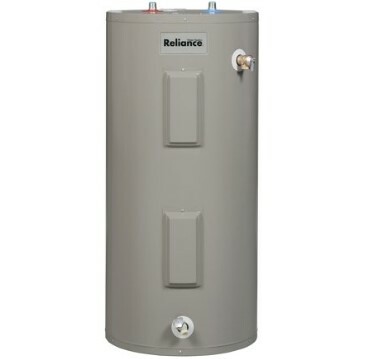
This is the type of thing you’re going to see in most houses. Yeah, this isn’t cheap, but it has capacity, and solid engineering. Reliance is another one of those big names in this sort of thing, and that quality holds up with this unit.
It’s not fun to get something like this moved, believe me I know. However, once you get it where it needs to go, it's literally a three-step process to install and connect it.
Features
- Power Source: Electricity (240v).
- Capacity: 30 gallons.
- Adjustable: Yes.
- Easy to Hook Up: Very.
- Outlet: Appliance 240v.
- Pressure Release Valve: Yes.
Performance
For three or fewer people, this is a go-to concept. It can hold up to three showers a day, laundry use, dish washing, you name it. It replenishes rapidly, and it is a durable piece of engineering.
Is it perfect? No such thing, but the thirty gallon water heater has been refined by this point.
Pros:
| Cons:
|
Conclusion
Don’t try to use a water heater this size in a house with more than three occupants. We’re going to see some higher-capacity ones for that, and they’re not all electric. But, for a three person house (or two adults and two children), this works just fine.
Reliance 6 40 EORS: Check the current price
Best Propane Water Heaters
4. 50 Gallon Gas Water Heater | Reliance 6 50 PBRT
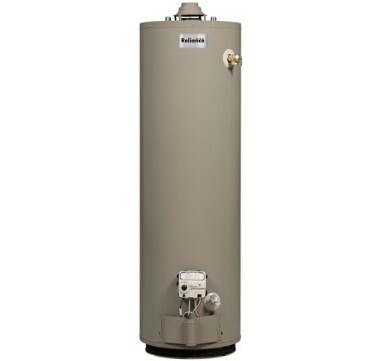
If you’re not going with electric, honestly, propane is probably the best incendiary heat source for something like this. Propane is fairly green, it’s easily produced and renewable, and it’s not that expensive depending on use. For grills, for space heaters, and for water heaters, you can get a good amount of mileage out of tanks of the stuff, too.
Propane is a compressed and explosive gas. So, it has its dangers. Though, accidents are rare and often due to stupidity.
Features
- Power Source: Propane.
- Capacity: 50 gallons.
- Adjustable: Yes.
- Easy to Hook Up: Very.
- Outlet: N / A
- Pressure Release Valve: Yes.
Performance
If I’m not using electricity, I would probably opt for propane. A nice thing with it is, even if your power goes out, you can still have hot water. As someone who lives in a place where hurricanes can knock power out, this can be a godsend.
Propane tanks are heavy, though.
Pros:
| Cons:
|
Conclusion
Always be aware of the dangers of highly flammable gas. If you follow proper safety procedures, and don’t be stupid, it’s unlikely anything will go horribly wrong. I would rather use propane than other fuel sources, and at least you have hot water if the power goes out.
Reliance 6 50 PBRT: Check the current price
Best Gas Hot Water Heaters | Models Powered by Natural Gas
5. 30-Galoon Water Heater | Reliance Water Heater CO
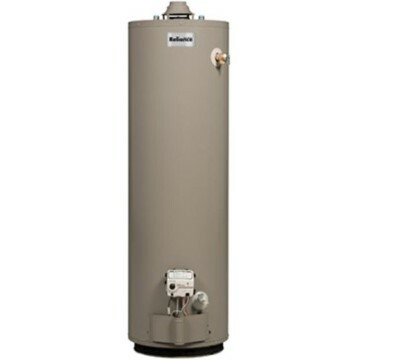
Natural gas isn’t a bad substance in and of itself. However, it's less efficient than propane, costlier, and has more troublesome sources. Natural gas, which is largely methane, can be artificially produced, but it's costly to do. Most natural gas still comes from the ground, often a byproduct of oil, coal, or geothermal activity.
However, it's less hassle to use natural gas, because it tends to be larger tanks, which someone comes and fills. This thirty gallon tank is perfectly serviceable, and ideal for a house in an area where gas is affordable, and easy to procure.
Features
- Power Source: Natural gas.
- Capacity: 30 gallons.
- Adjustable: Yes.
- Easy to Hook Up: Not bad.
- Outlet: N / A
- Pressure Release Valve: Yes.
Performance
This water heater is really nice for a smaller home where gas is easy to come by. In parts of the country where it gets particularly cold, gas services are far more prevalent, competitive, and available. This can be convenient, and less hassle than propane. It will also provide hot water without electricity.
If you’re already heating your home with gas, you may as well use it for your heater too, it won’t raise the amount of fuel you use by much.
Pros:
| Cons:
|
Conclusion
I am comfortable recommending this water heater, especially if you already use gas to heat your house.
Reliance Water Heater CO: Check the current price
6. 76-Gallon Water Heater | RHEEM-RUUD
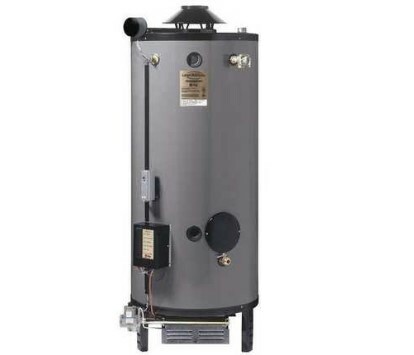
This is what you need if you have a larger family, or tenants in your house. This seventy-six-gallon water heater wouldn’t be practical with electricity. High capacity electrical ones do exist, but they don’t work great.
This means you’re stuck with natural gas, but it’s not so bad, and this puppy is efficient and very safe.
Features
- Power Source: Natural gas.
- Capacity: 76 gallons.
- Adjustable: Yes.
- Easy to Hook Up: Not bad.
- Outlet: N / A
- Pressure Release Valve: Yes.
Performance
If you have a larger amount of people, or you have a business using a lot of hot water, then you’re going to need a heater with this capacity and reliability. It's just how it is.
Electric solutions of this scale tend to produce awful power bills, and they tend not to work that well. Heating water of this volume needs more thermal output, which natural gas can achieve.
Pros:
| Cons:
|
Conclusion
Definitely go with this one if you’re heating a huge volume of water for one reason or another.
RHEEM-RUUD: Check the current price
Best Solar Water Heater
7. 26-Gallon Stainless Steel Solar Hot Water Heater | Duda solar
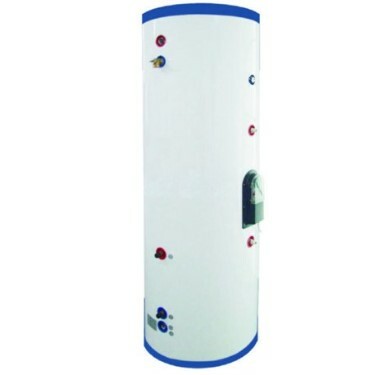
Solar power has its serious flaws. As I said earlier, it relies on direct, unobstructed sunlight. Temperature shifts to cooler levels can make thermal loss of solar water a problem too.
This tank abates some of that, as it actually can store a larger quantity of water than direct-from-panel heating does.
Features
- Power Source: Solar.
- Capacity: 26 gallons.
- Adjustable: Yes.
- Easy to Hook Up: Not bad.
- Outlet: N / A
- Pressure Release Valve: Yes.
Performance
I am only comfortable with solar in warm, and enduringly sunny places. Seriously, just as with solar power, solar water heat is just not that dependable.
This tank helps, but solar is slow, so the tank would refill slowly. If you have only one or two people, you could probably, with care, maintain a supply of hot water, as long as that strong sunlight persisted.
This tank is of a fine design, it’s just the power source that’s a problem with this.
Pros:
| Cons:
|
Conclusion
If you live in the desert, this would actually work pretty well, though the heat replenishing would be slow due to the passive way the thermal energy is gathered.
Duda Solar: Check the current price
9 Best Hot Water Heaters Comparison Table
1
Ecosmart
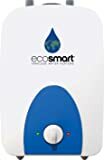
Ecosmart ECO MINI 1 1.5-Gallon 120V Electric Mini Tank Water Heater
2
Bosch Thermotechnology
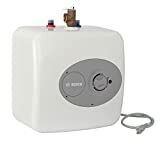
Bosch Electric Mini-Tank Water Heater Tronic 3000 T 4-Gallon (ES4) - Eliminate Time for Hot Water - Shelf, Wall or Floor Mounted
3
Bosch Thermotechnology

Bosch Electric Mini-Tank Water Heater Tronic 3000 T 2.5-Gallon (ES2.5) - Eliminate Time for Hot Water - Shelf, Wall or Floor Mounted
4
Ecosmart
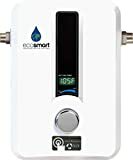
EcoSmart ECO 11 Electric Tankless Water Heater, 13KW at 240 Volts with Patented Self Modulating Technology
5
Ariston
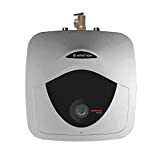
Ariston Andris 4 Gallon 6 Year 120-Volt Corded Point of Use Mini-Tank Electric Water Heater
6
ECOTOUCH
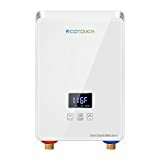
ECOTOUCH Electric Tankless Water Heater Point-of-Use Hot Water Heater Digital Display for Energy Efficiency 5.5kW at 240V, White
7
Ecosmart
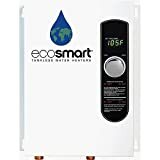
Ecosmart ECO 18 Electric Tankless Water Heater, 18 KW at 240 Volts with Patented Self Modulating Technology
8
American Standard Water Heaters
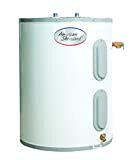
American Standard CE-12-AS 12 gallon Point of Use Electric Water Heater
9
Rinnai
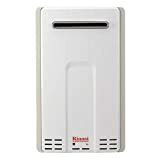
Rinnai V Series HE Tankless Hot Water Heater: Outdoor Installation
My Personal Experience With a Tank Water Heater
Okay, so I have just a handful of brief examples of things I’ve encountered, with water heaters over the years. Things that make me aware of my water heater on a daily basis for the rest of my life.
The first one is a caution about setting these up. The place I lived a few years back (where the raccoon attacked the hot tub), the land lady decided to get a tank water heater for us, which, huzzah. She’d been trying to use solar, and oh boy, we’ll get to that too.
Anyhow, I went with her to the store, we bought a 30 gallon heater - plenty for our needs, and brought it home. I offered to hook it up - honestly, it’s usually not rocket science, it’s really not. She demanded to have a “professional” do it. Well, her house, she wants to spend money when I’d have done it for free, okay then.
Well the guy she got wasn’t a licensed plumber nor a contractor. He was just this local handyman type guy. Seemed nice enough to be honest, but the problem was, he drank like a fish. So, he kept screwing it up. I wound up having to hook it up myself, and she was out whatever cash she gave the guy. The thing to take away from this one is, don’t be afraid to hook these up yourself.
Go on YouTube and watch two or three videos where people show how to do it. Repeat exactly what they do - none of it is that demanding nor hard if you follow instructions. If you just aren’t capable, or comfortable doing this, that’s fine. But be choosy with whom you have do it for you. Get a licensed person.
These other two are much shorter. First, solar. If you live in specific parts of the world, namely deserts or particularly sunny tropical places, this doesn’t work out that well. Most of the world, the sunlight is randomly blocked, it gets cold which loses a lot of the heat soaked up, and the sunlight isn’t as bright.
My landlady's horrible solar heater never gave us hot water, and we were in Florida, which is often thought of as “sunny”. It's humid here, which diminishes the power of the sunlight due to refraction, it rains often, it's cloudy often.
Finally, be careful with the mini ones. With a few exceptions, these tend to not like to last. The one in the kitchen in that place died umpteen times, once needing me to even re-solder a part onto the control board.
FAQ
What is the best tank water heater?
That depends on the power source you want to use, and how many people. That said, this question has no cardinal answer, so I won’t even try to fabricate one.
What size do I need?
For a residence, you need to provide about 10 gallons a day per occupant. This includes showers, other forms of washing up, laundry, and any kitchen sanitation.
How to drain a tank water heater?
There’s usually a spigot / faucet / tap you can connect a hose to, in order to drain the tank. If you just want to drain it, and your plumbing is working, you could just cut the cold water intake off, and let hot water run in a shower and / or sinks, too. Use the hose though.
Do I really need an expansion tank on my water heater?
No. If you’ve exceeded the capacity of your heater that much, you need a bigger heater, period.
How long does it last?
This varies wildly, but most of them should last ten years if not more. However, smaller units and more experimental technologies are less long-lived in most cases.
Pros & Cons
Well, if you want hot water, you’ve no choice but to use some kind of hot water heater. Well, unless you want to boil the water, which is still an obtuse water heater solution, and a very less than intuitive one.
Still, let’s go over the pros and cons of each type in a recap one more time. It is important to choose wisely in the type of heater you’ll use, and to understand the challenges each one faces.
Compact Electric
Pros
- Takes up little space.
- Doesn’t burn power constantly to maintain a large tank.
- Easy to install.
Cons
- Limited capacity.
- Uses power to heat water faster.
- Less long-lived.
Standard Electric
Pros
- Refined technology.
- Easily repaired.
- Fuel doesn’t have to be refilled.
- Not an explosion danger.
Cons
- If the power goes out, you have no hot water.
- They drive your power costs up.
- They continue to use power to maintain a large volume of hot water throughout their time being active.
Propane
Pros
- Always has hot water, even if the power goes out.
- Fuel is affordable.
- Very clean, environmentally-sound fuel.
Cons
- Propane is volatile.
- You have to replace tanks.
- Tanks are awkward and a hassle.
- Requires a pilot light that can be scary to relight.
Natural gas
Pros
- Like propane, it always provides hot water, even if the power goes out.
- If you have gas heat, you’re likely to be already set up for this.
- It’s not that expensive.
- It’s less hassle to refill than propane, by a significant degree.
Cons
- Like propane, it's explosive.
- You do have to stay on keeping fuel reserves filled, which just becomes a hassle regardless the benefits.
- It can be harder to connect due to gas lines and other “scary” infrastructure components involved.
Solar
Pros
- Very energy smart.
- Perfectly clean.
- Reliable in sunny areas.
Cons
- Not reliable in most places.
- The power used to pump water up to roof panels, offsets some of the power saved by solar sources.
- On cold days, it loses a lot of heat even while the sun is heating the water.
- Solar panels break, grow algae and have other annoyances.
Conclusion
Hot water is a wonderful thing to have, and anyone who’s lost access to it due to disasters or power outages, can attest to how much you miss it when it’s gone. Hot water heaters are expensive, and a big choice.
Make sure you choose the right capacity, form factor, and power source for your needs. Having to correct this after the fact is an onerous experience to say the absolute least.
We’re sure one of these will suit your needs, but be sure to shop around before buying!



